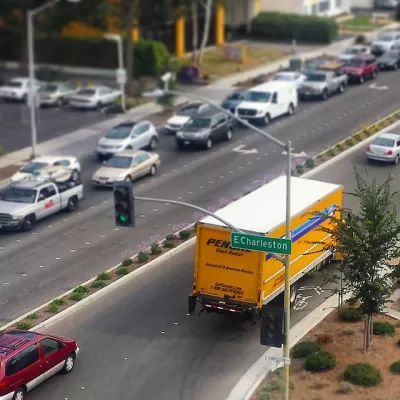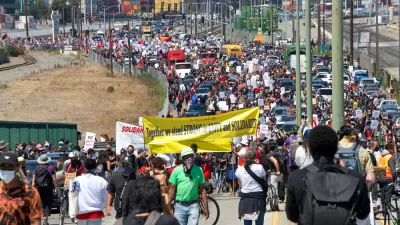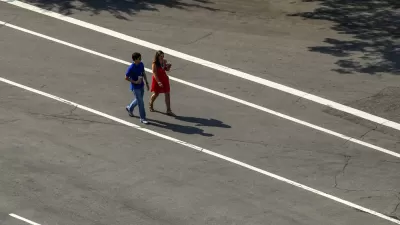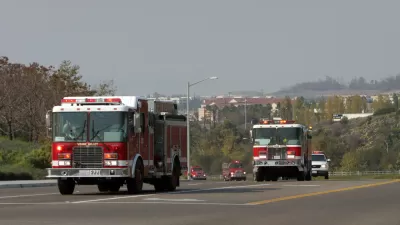An explainer post on that much-lamented feature of contemporary communities—the stroad.

Charles Marohn writes an explainer post about stroads for Strong Towns, answering the second question posed in the headline above thusly: "If we want to build towns that are financially productive, we need to identify and eliminate stroads."
According to Marohn, streets and roads are two different things, and stroads create a hybrid of both of them. Streets are a platform for building wealth, and "[o]n a street, we're attempting to grow the complex ecosystem that produces community wealth," writes Marohn. "In these environments, people (outside of their automobiles) are the indicator species of success. Successful streets are environments where humans, and human interaction, flourish."
Roads, on other hand, connect productive places. Marohn suggests thinking of roads as like a railway, but on for cars.
Stroads then are like futons, says Marohn: "just as a futon is neither a particularly good bed nor a particularly good couch, a stroad is neither a particularly good road or a particularly good street."
With that helpful explanation in place, Marohn goes to put the onus on departments of transportation to take responsibility for the threats posed by stroads, and return them to more productive uses. To supplement the article, Strong Towns also produced the following video, to further drive home these points.
FULL STORY: The Stroad

Planetizen Federal Action Tracker
A weekly monitor of how Trump’s orders and actions are impacting planners and planning in America.

Map: Where Senate Republicans Want to Sell Your Public Lands
For public land advocates, the Senate Republicans’ proposal to sell millions of acres of public land in the West is “the biggest fight of their careers.”

Restaurant Patios Were a Pandemic Win — Why Were They so Hard to Keep?
Social distancing requirements and changes in travel patterns prompted cities to pilot new uses for street and sidewalk space. Then it got complicated.

Platform Pilsner: Vancouver Transit Agency Releases... a Beer?
TransLink will receive a portion of every sale of the four-pack.

Toronto Weighs Cheaper Transit, Parking Hikes for Major Events
Special event rates would take effect during large festivals, sports games and concerts to ‘discourage driving, manage congestion and free up space for transit.”

Berlin to Consider Car-Free Zone Larger Than Manhattan
The area bound by the 22-mile Ringbahn would still allow 12 uses of a private automobile per year per person, and several other exemptions.
Urban Design for Planners 1: Software Tools
This six-course series explores essential urban design concepts using open source software and equips planners with the tools they need to participate fully in the urban design process.
Planning for Universal Design
Learn the tools for implementing Universal Design in planning regulations.
Heyer Gruel & Associates PA
JM Goldson LLC
Custer County Colorado
City of Camden Redevelopment Agency
City of Astoria
Transportation Research & Education Center (TREC) at Portland State University
Camden Redevelopment Agency
City of Claremont
Municipality of Princeton (NJ)





























